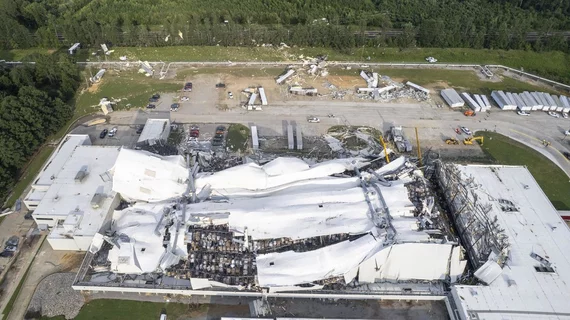Pfizer plant takes heavy tornado damage, loses approximately 50,000 pallets of sterile injectables
A Pfizer manufacturing plant in North Carolina was all but leveled this week when an EF-3 tornado swept through, destroying tens of thousands of pallets containing medicine, according to officials.
"I've got reports of 50,000 pallets of medicine that are strewn across the facility and damaged through the rain and the wind," Nash County Sheriff Keith Stone told officials.
Local news outlets, NBC affiliate WRAL and CBS affiliate WNCN, report that the tornado came through midday on July 19. It destroyed two of the drugmaker’s buildings (one storage and one distribution), 75 hauling trucks and 100 cars parked in the area.
The Rocky Mount, North Carolina-based facility is said to be responsible for producing 25% of Pfizer’s sterile injectables used by hospitals in the U.S. One of the largest sterile injectable facilities in the world, it spans more than 1.4 million square feet on 250 acres in Eastern North Carolina. It produces more than 200 million units of products such as anesthesia, analgesia, therapeutics, anti-infectives and neuromuscular blockers annually.
Following the events of July 19, Pfizer tweeted a statement updating the public on what was known as the time.
“We can confirm that the Pfizer Rocky Mount facility was damaged by the tornado. Pfizer colleagues at the site followed our established safety protocol and were able to evacuate. They are safe and accounted for,” the first tweet reads.
“At this point, there are no reports of serious injuries. We are assessing the situation to determine the impact on production,” Pfizer continued. “Our thoughts are with our colleagues, our patients and our community as we rebuild from this weather incident,” the company said.
The specifics of how the tornado damage will impact production at the facility are not yet known, but some officials are predicting that it will inevitably lead to shortages of certain sterile injectable products while Pfizer either rebuilds or moves the manufacturing of those products elsewhere.

